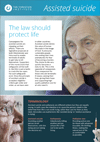The BBC has come under fire over a documentary showing an assisted suicide taking place at a facility in Switzerland.
The 90-minute programme, due to be aired on 10 February, follows the story of businessman Simon Binner, who travelled to the facility having been diagnosed with motor neurone disease in January 2015.
The documentary, called “How to Die: Simon’s Choice”, shows Binner lying on a bed before opening a valve that allows a lethal drug to enter his body.
Cheerleaders
The BBC insists that the moment of him actually dying is not shown, but The Daily Telegraph has reported that there is a fleeting shot of his corpse.
It will be the first time footage from inside Switzerland’s second largest assisted suicide clinic will be shown on British television.
Pro-life campaigners have criticised the BBC for being a “cheerleader for suicide”.
Deeply disturbed
This has the capacity to encourage others to take their own lives.
Alistair Thompson
Alistair Thompson, spokesman for Care Not Killing, said: “We are deeply disturbed by this. This has the capacity to encourage others to take their own lives.”
The documentary was filmed against the backdrop of a House of Commons debate last year, in which MPs voted resoundingly against a Bill to legalise assisted suicide.
During the programme, Binner’s wife is filmed saying she disagrees with assisted suicide, but she later changes her mind.
Normalising
Simon Binner’s story hit the headlines last year. He announced his plans to get help to kill himself on the professional networking site LinkedIn, after being told he had two years to live.
In 2014, the BBC was criticised for ‘gradually normalising’ assisted suicide, after it broadcast a television drama featuring the story of a pregnant woman who agreed to prepare lethal drugs for her ill mother.
A critic said that it was never once mentioned that assisted suicide is against the law, and the programme failed to consider the consequences of helping someone to kill themselves.
Change the law
The BBC was previously accused of cheerleading for assisted suicide in 2011, by airing a documentary showing another person with motor neurone disease getting help to kill themselves.
In a strongly-worded letter of complaint to BBC bosses, four Peers said it was “not the job” of the Corporation to “become a lobbying organisation or a cheerleader for those who wish to change the law”.


